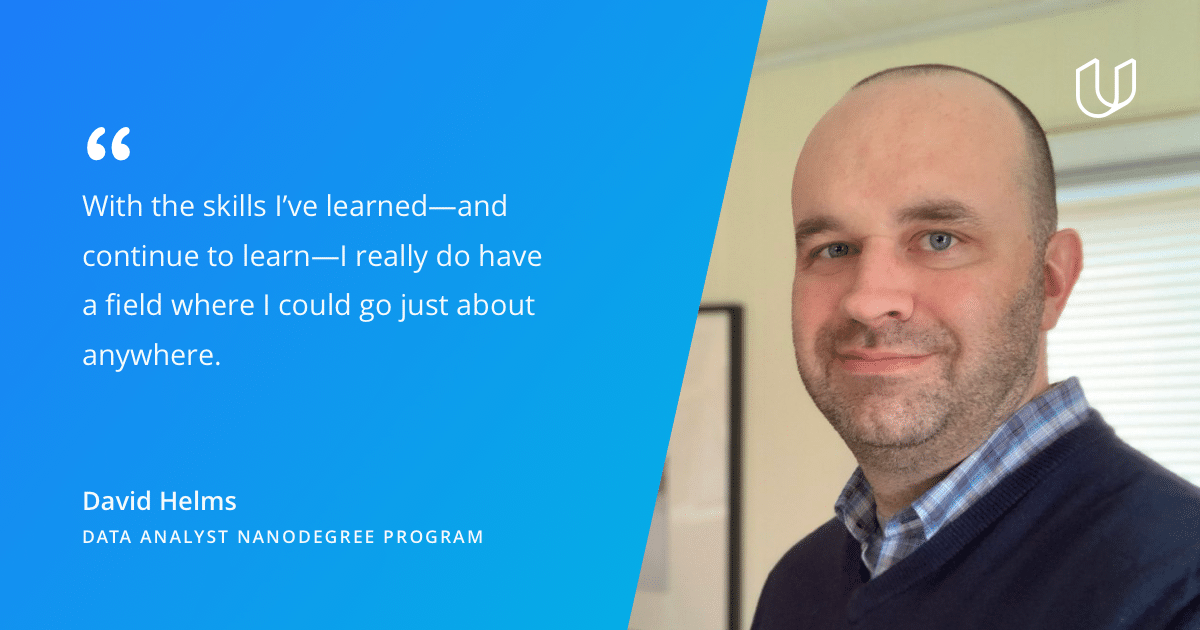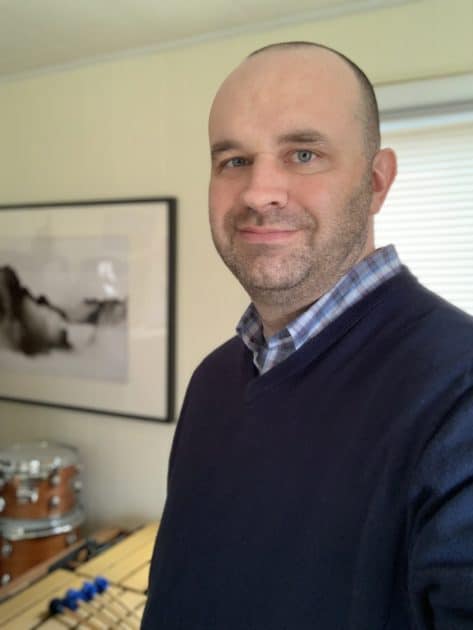Find the right nanodegree program for you.
Start Learning
Every one of the graduates we talk to tells us a different story about how they first discovered Udacity and the motivation to change their career and life through learning. Some were looking to re-enter the workforce after a long break, others had been inspired by surging tech salaries and shining employment prospects. Some people were bored with their current jobs, and others wanted to upskill their tech skills in a specialist area. David Helms’ route to Udacity actually started right here—on these very pages—with the story of a friend and former professor, Michael Overman.
Michael’s story was simple but striking—he was an experienced music professor who, after 15 years teaching, had decided to seek better career advancement opportunities by learning Android development. He completed Udacity’s Android Developer Nanodegree program and, within a month of graduating, landed a job as a developer.
For David, with a similar background in music and academia, and a similar desire to change careers, the story struck a chord immediately. We spoke with David to hear about his own exciting career change.
Tell us a little about your background and why Michael’s story particularly inspired you.
I first met Michael when I was studying for a Master’s back in 2001 and he was one of my professors. At that time, I wanted to teach music in college as a professor too, but after working on a doctorate for a few years, I honestly got really burned out with academia. So I ended up getting a job in international tourism, organizing trips for all manner of schools, universities, churches, and civic groups.
But after some years, you started losing interest in the career you’d chosen didn’t you?
For a long while, I really enjoyed what I was doing, and I was successful doing it. But eventually I realized I wanted to do something different. So towards the end of 2016, I left my job and started studying international relations, because I really wanted to get into government work and serve my country in some way.
How did your first foray into a different career track go?
I studied for a little over a year and it felt like I wasn’t getting anywhere—that’s really the easiest way I can describe it. There was obviously a lot of writing, and I found it a little overwhelming. Around that time, I saw the Udacity article about Michael’s story, and started reading it. I honestly hadn’t pictured myself with a career in technology before, but his story and what he’d accomplished encouraged me to take a look at Udacity’s website.
Was this the first time you’d considered studying something related to technology?
When I first started college, I majored in computer science for around a year and a half. Music is my first love, but computers sounded interesting when I first started looking at colleges. But learning to code was almost like learning Greek. It really is another language and I’d never really had a computer for the first 18 years of my life. That’s weird to hear today, but I went to college in 1995 and it wasn’t that uncommon then. At 18 or 19 years old, I didn’t think it was what I wanted to do, so I switched to music.
So what did you think of Udacity’s catalog of Nanodegree programs?
I started looking through the coding programs first, and I honestly had the same sense of feeling overwhelmed as I had when I was an undergraduate. But then data analysis really caught my eye. I know that I have an analytical mindset, and the idea of using it in data intrigued me. I looked at what the Udacity program covered, and I did some research on the field and on what data analysis work was really like. It amazed me how big the field was, how much demand there was going to be for data skills, and—being honest—how lucrative working in data could be.
Having found a subject you were interested in, what did you do next?
I reached out to Michael and asked him about his experiences studying with Udacity. We ended up chatting one night for a long time—he told me his whole story, from starting with Udacity to landing his current job. He was so encouraging and positive about his experience. And so, you know, I just went for it!
I started with the Data Foundations Nanodegree program [now Business Analytics]. I’d never done anything with SQL or Tableau before, so it was a good challenge, but not overwhelming. I could tell from the start that it was a very well-balanced, well-designed program—and I’ve worked on curriculum myself as a former teacher and graduate assistant. It was very straightforward in what it was trying to teach you.
I think one of the big things that attracted me to Udacity was that I’d be learning a curriculum developed by people that worked for some of the biggest and most successful tech companies. And that they’d designed it with the specific aim of teaching people like me the skills that are most in-demand with employers. In my transition from my previous job to now, that is what I desperately needed.
At what point in your data journey did you start looking for roles in the industry?
After graduating. I started my job search fairly early in the next year, and I also jumped pretty much straight away into the Data Analyst Nanodegree program. I applied to lots of jobs around Virginia, and all along the Atlantic coast. I got a bunch of interviews with different employers, some of them really quickly. With my current job, the recruitment process was a little longer, but when I interviewed with them, I felt really prepared.
You must have been, because they offered you the job, didn’t they? What are you working as now?
They did! I now work as a Coordinator of Data Analytics at Eastern Mennonite University in Virginia. I’m working in their development office. They have a large team who work with donors across the country, and my position is basically serving them with all manner of projects—collecting data going to them, working with other divisions of the university, creating reports for different executives. The work touches many different departments around the university.
Are you using any of the skills you learned in the program?
Well of course I use things like SQL and Tableau really every day, and I am looking forward to doing more with data visualization with Tableau soon. And beyond that, one big thing I learned from the program was the process of receiving a request for information, and constructing queries that will provide you with the information that someone needs. I feel very prepared for that in my work from what I learned in the program.
[pullquote]They’d designed it with the specific aim of teaching people like me the skills that are most in-demand with employers.[/pullquote]
Having graduated your Nanodegree program and landed a job in data, how do you feel about your new career track?
I’m so thankful for the role and the opportunity. It has taken me through the transition from my last career. I feel like now, with the skills I’ve learned—and continue to learn—I really do have a field where I could go just about anywhere. I know I’m in my first job in the data world, but I feel like everything I’m learning right now will make me more and more in-demand.
˜
Thanks so much for sharing your story David! We’re so pleased your mid-career change has been so successful, and that it’s something you’re so clearly excited about! We can’t wait to hear how your data career unfolds as you continue to add even more to your experience and skill set.







